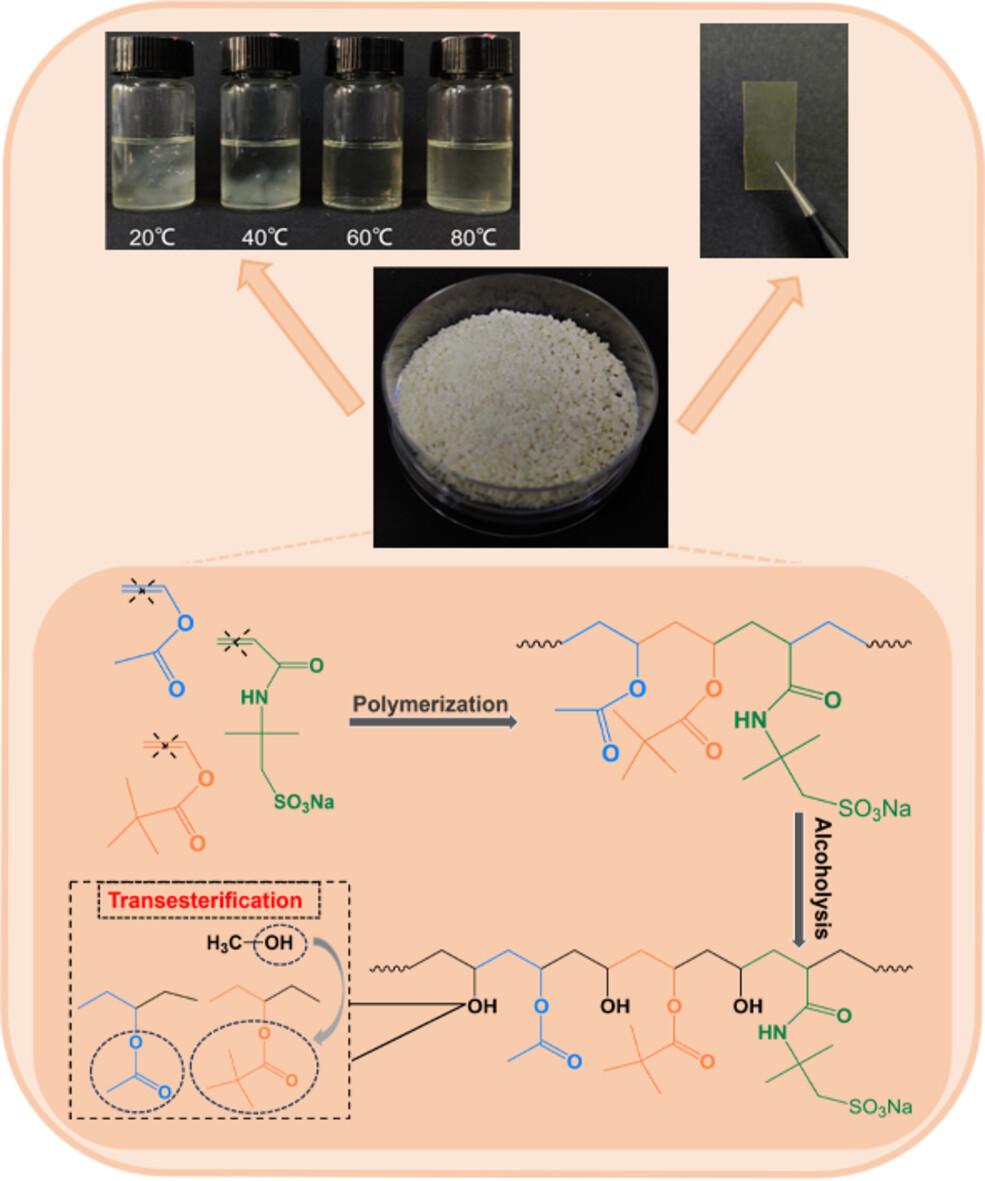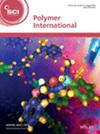求助PDF
{"title":"Effect of sodium 2-acrylamido-2-methylpropanesulfonate on the structure and properties of thermoplastic polyvinyl alcohol copolymers","authors":"Liang Wang, Jiawei Zhao, Bing Song, Liuchun Zheng, Yong Liu","doi":"10.1002/pi.6663","DOIUrl":null,"url":null,"abstract":"<p>Thermoplastic poly(vinyl alcohol) (PVA) with water-soluble behavior has received great attention. In this work, a thermoplastic PVA was prepared via solution radical polymerization of vinyl acetate, vinyl pivalate and sodium 2-acrylamido-2-methyl propane sulfonate (SAMPS). The effects of SAMPS content on the structure and properties of modified poly(vinyl alcohol) (MPVA) were investigated. On increasing the proportion of SAMPS, the characteristic band of –OH moved to a larger wavenumber. Compared to PVA, the melting temperature (<i>T</i><sub>m</sub>) of MPVA decreased from 223.1 to 161.5 °C at 0.03 mol of SAMPS, and the initial thermal decomposition temperature (<i>T</i><sub>d</sub>) of MPVA increased from 244.3 to 262.2 °C at 0.05 mol of SAMPS. The crystallinity of the resin reduced from 51.46% to 10.21%. The enlarged difference between <i>T</i><sub>d</sub> and <i>T</i><sub>m</sub> ensured the preparation of MPVA by thermal processing. The maximum tensile strength and elastic modulus of the obtained sheets were 137.56 and 2639.32 MPa, respectively. The introduction of SAMPS reduced the alcoholysis degree from 99.03% to 95.80%. The high alcoholysis degree of MPVA meant that it could be dissolved in water at 60 °C. This type of thermoplastic PVA shows a promising application on film and textiles that require water solubility. © 2024 Society of Chemical Industry.</p>","PeriodicalId":20404,"journal":{"name":"Polymer International","volume":"73 10","pages":"815-823"},"PeriodicalIF":3.6000,"publicationDate":"2024-05-20","publicationTypes":"Journal Article","fieldsOfStudy":null,"isOpenAccess":false,"openAccessPdf":"","citationCount":"0","resultStr":null,"platform":"Semanticscholar","paperid":null,"PeriodicalName":"Polymer International","FirstCategoryId":"92","ListUrlMain":"https://scijournals.onlinelibrary.wiley.com/doi/10.1002/pi.6663","RegionNum":4,"RegionCategory":"化学","ArticlePicture":[],"TitleCN":null,"AbstractTextCN":null,"PMCID":null,"EPubDate":"","PubModel":"","JCR":"Q2","JCRName":"POLYMER SCIENCE","Score":null,"Total":0}
引用次数: 0
引用
批量引用
Abstract
Thermoplastic poly(vinyl alcohol) (PVA) with water-soluble behavior has received great attention. In this work, a thermoplastic PVA was prepared via solution radical polymerization of vinyl acetate, vinyl pivalate and sodium 2-acrylamido-2-methyl propane sulfonate (SAMPS). The effects of SAMPS content on the structure and properties of modified poly(vinyl alcohol) (MPVA) were investigated. On increasing the proportion of SAMPS, the characteristic band of –OH moved to a larger wavenumber. Compared to PVA, the melting temperature (T m ) of MPVA decreased from 223.1 to 161.5 °C at 0.03 mol of SAMPS, and the initial thermal decomposition temperature (T d ) of MPVA increased from 244.3 to 262.2 °C at 0.05 mol of SAMPS. The crystallinity of the resin reduced from 51.46% to 10.21%. The enlarged difference between T d and T m ensured the preparation of MPVA by thermal processing. The maximum tensile strength and elastic modulus of the obtained sheets were 137.56 and 2639.32 MPa, respectively. The introduction of SAMPS reduced the alcoholysis degree from 99.03% to 95.80%. The high alcoholysis degree of MPVA meant that it could be dissolved in water at 60 °C. This type of thermoplastic PVA shows a promising application on film and textiles that require water solubility. © 2024 Society of Chemical Industry.
2-丙烯酰胺基-2-甲基丙磺酸钠对热塑性聚乙烯醇共聚物结构和性能的影响
具有水溶性的热塑性聚乙烯醇(PVA)备受关注。本研究通过乙酸乙烯酯、特戊酸乙烯酯和 2-丙烯酰胺基-2-甲基丙烷磺酸钠(SAMPS)的溶液自由基聚合制备了一种热塑性聚乙烯醇(PVA)。研究了 SAMPS 含量对改性聚乙烯醇(MPVA)结构和性能的影响。随着 SAMPS 含量的增加,-OH 的特征带向更大的波长移动。与 PVA 相比,在 SAMPS 含量为 0.03 摩尔时,MPVA 的熔融温度(Tm)从 223.1 ℃ 降至 161.5 ℃;在 SAMPS 含量为 0.05 摩尔时,MPVA 的初始热分解温度(Td)从 244.3 ℃ 升至 262.2 ℃。树脂的结晶度从 51.46% 降至 10.21%。Td 和 Tm 之差的扩大确保了 MPVA 的热加工制备。所得板材的最大拉伸强度和弹性模量分别为 137.56 和 2639.32 兆帕。引入 SAMPS 后,醇解度从 99.03% 降至 95.80%。MPVA 的高醇解度意味着它可以在 60 °C 的温度下溶解于水。这种热塑性 PVA 在需要水溶性的薄膜和纺织品上有着广阔的应用前景。© 2024 化学工业协会。
本文章由计算机程序翻译,如有差异,请以英文原文为准。



 求助内容:
求助内容: 应助结果提醒方式:
应助结果提醒方式:


